Caryn
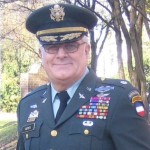 I have been telling you about some of the family connections I have made recently, and how surprised I have been at just who some of these people are. It isn’t always about them being famous, but rather about what amazing things they have done in their lives. So often we don’t hear what our family members have accomplished…mostly because they are too humble to really share all of their accomplishments. Recently, I made a family connection with the Noyes side of my husband, Bob Schulenberg’s family. This would be Bob’s grandmother, Nettie Noyes Knox’s side of the family. The connection was one that in all reality, I stumbled on. I had been searching for information…over a year ago, and I had copied the web addresses of several sites I thought might help, and put them into a Word document. There they sat for far too long. Finally, I found the time to check on one of them, and found the email for Paul Noyes. What an amazing find that was!!
I have been telling you about some of the family connections I have made recently, and how surprised I have been at just who some of these people are. It isn’t always about them being famous, but rather about what amazing things they have done in their lives. So often we don’t hear what our family members have accomplished…mostly because they are too humble to really share all of their accomplishments. Recently, I made a family connection with the Noyes side of my husband, Bob Schulenberg’s family. This would be Bob’s grandmother, Nettie Noyes Knox’s side of the family. The connection was one that in all reality, I stumbled on. I had been searching for information…over a year ago, and I had copied the web addresses of several sites I thought might help, and put them into a Word document. There they sat for far too long. Finally, I found the time to check on one of them, and found the email for Paul Noyes. What an amazing find that was!!
Paul has blessed me with information that I hadn’t found, and I sent him some pictures I had of Noyes family members, to add to his tree. Then he sent back more information on one of the pictures I sent him. He had no idea where that would lead…but I knew, because I had been thinking about a story about him and his family since I received his first response to my email. I love making these new connections, but some of them turn into a great cousinship and friendship too, and those are the most special ones, for sure. I had sent a picture of Eugene Noyes Jr in uniform…but Paul knew from looking at the uniform, that the uniform was from World War II. He knew this because of the 15th Army Air Forces shoulder patch on the uniform. I suppose I might have caught that too, since I had seen my dad’s 8th Army Air Forces shoulder patch, but it was simply something I didn’t notice at all.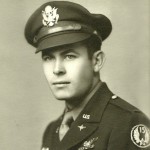
In my defense, I am not a retired after 22 years veteran…and Paul is. Well, that got my curiosity going again. I asked Paul to tell me about his service time. True to the form I have seen with most military men and women…a humble breed…Paul told me a little bit about what he did. He spent most of his 22 year Army career was as an Army aviator. He started out as an Airborne Ranger, then served in Vietnam in Special Forces, where he was wounded. While recovering from the wounds, he was selected for flight school and served in Army Aviation special ops. I did a little research on what Special Operations does exactly, and this is the summary I came up with, “Conduct global special operations missions ranging from precision application of firepower to infiltration, aviation foreign internal defense, exfiltration, resupply and refueling of SOF operational elements.” If you’re like me, that doesn’t clarify much. Upon further research, I found that much of what Special Operations did in Vietnam was to train groups of the Vietnamese Army so they can train the remaining army members. Of course, I am probably generalizing Special Operations to a large degree, and I will have to ask Paul to tell me more about it as soon as I have a chance.
After he was wounded, Paul’s entire career changed when he was selected to become an Army Aviator. Having worked with a pilot for over 18 years now, I have had the opportunity to fly…and I use the term loosely…a small 4 seater plane. Basically what I really did was steer it, and I didn’t do that so well, because it kept climbing, and had to be brought back to level. It was an opportunity given to me with no preparation, and I really enjoyed it. I think to a degree, that is what happened with Paul too. After being wounded, he was given an opportunity to switch gears and do something he never expected to do, and he excelled at it. That is an  awesome career change, and one I look forward to hearing more about.
awesome career change, and one I look forward to hearing more about.
Of course, in a 22 year career, Paul was also building a family. He was married to his lovely wife, Elizabeth, who is an author, and after collaborating with 11 other authors on a book called “A Dozen Apologies”, she released her first book this past August, called “Imperfect Wings”. I look forward to reading both. Paul and Elizabeth have two children, daughter Shari and husband Jimmy Nardello, and their children Cameryn and Reid; and son Chris who is married to Dr Christina Noyes, and they have a son named Owen. I am really looking forward to getting to know these wonderful, new to me cousins as time goes on.
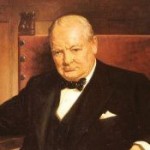 On this day, January 24, 1965, my 15th cousin once removed, Winston Leonard Spencer Churchill passed away. As an eight year old girl, his passing had little impact on my life…then. I wasn’t even aware that he was my cousin, that he had passed away, or of the impact his life had on the people of the world. I especially had no knowledge that as his cousin, I might have been in line for part of his estate, but I was in line for part of it, nevertheless.
On this day, January 24, 1965, my 15th cousin once removed, Winston Leonard Spencer Churchill passed away. As an eight year old girl, his passing had little impact on my life…then. I wasn’t even aware that he was my cousin, that he had passed away, or of the impact his life had on the people of the world. I especially had no knowledge that as his cousin, I might have been in line for part of his estate, but I was in line for part of it, nevertheless.
Of course, in the end, that portion of his estate went to England. From what I am able to gather, Winston Churchill expressed a desire to divide his estate among all of his living relatives…all of them, and believe me, there were a lot of them. The catch was that all of them had to be found or the money went to the state. With family members all over the world, that was a very tall order, and one that would prove fruitless…or at least too big for the task to be completed.
They found our family and the rest of my dad’s side of the family, but somewhere along the way, the search for Winston Churchill’s many family members dwindled to a dead end, and the portion of the estate that was to go to us, was lost to us forever. It’s strange that even then, I knew nothing of the man, the money, or the world-wide search that had taken place. Many have said that perhaps they didn’t search as hard as they should have, and others have said that the search was handled be a disinterested agency. Whatever the case may be, the search failed to find everyone it needed to locate, and that was the end of the story.
I seriously doubt if the money, no matter how substantial, carried a huge impact of the wealth of England or the English Crown. I don’t know how much would have gone to each of the many relatives who were living at that time. It may have been such an insignificant amount that it would have gone almost unnoticed…or maybe it would have been enough change the life of every one of them forever. We will never know, because we don’t know the amount, for sure, or how many would have benefitted from it.
In later years, after I learned of the strangeness of Winston Spencer Churchill’s will, and of his relationship to me, and my part in his will, I wondered why he would have written such a will. He must have known how hard it would be to carry out his last request. He must have assumed that the share each person would receive would be small, at best. So, why would he write such a will? I’m sure he had his reasons, and I am just as sure that we will never know them, but I have never stopped wondering. I’m sure people would think that I wonder about it, because I’m sorry I didn’t get a share of the money, but in reality, it is my opinion that money is a tool to get the things you need, and to bless those around you. All too often, when handed a large amount of  money with no understanding that happiness does not come as a side effect of having it, money ends up ruining the life of the person who received it. So does that mean that I’m against wealth…certainly not. I just think that money has a place, and it makes a great tool, but a terrible master.
money with no understanding that happiness does not come as a side effect of having it, money ends up ruining the life of the person who received it. So does that mean that I’m against wealth…certainly not. I just think that money has a place, and it makes a great tool, but a terrible master.
I have great respect for Winston Spencer Churchill. His abilities, especially in winning wars are well known. I don’t believe he was crazy when he wrote out his will either, but was maybe a man who felt that he could do some measure of good for those who were his family, and by requiring that all be found, he eliminated the ability to leave his inheritance to a chosen few…just in case they were tempted not to look further.
 As I have been working through some of the hints on my Ancestry tree, I am amazed by the number of family members from varying sides of my family and my husbands family, who started their life in America, or moved early in their life in America, to the same places. I don’t know if they knew each other, or even if they were there at the same time, but the roots are there nevertheless. They may not have lived in the same town even, but sometimes it was close. One state that I just keep coming up with is Massachusetts. Who would have ever thought some of my roots would have come from Massachusetts?
As I have been working through some of the hints on my Ancestry tree, I am amazed by the number of family members from varying sides of my family and my husbands family, who started their life in America, or moved early in their life in America, to the same places. I don’t know if they knew each other, or even if they were there at the same time, but the roots are there nevertheless. They may not have lived in the same town even, but sometimes it was close. One state that I just keep coming up with is Massachusetts. Who would have ever thought some of my roots would have come from Massachusetts?
Recently I started talking to a relative from my dad’s side of the family that was traced to me through DNA matching. We have been unable to connect our two trees yet, because of limited information back through the generations, but DNA doesn’t lie, and we both have Fuller relatives in our background…and both sides come from…you guessed it, Massachusetts. I have also been looking at the Shaw side of my mother’s family because of another recent connection in Ancestry, that I’m not yet sure is related or not. Nevertheless, once again, I have run into Massachusetts as their point of origin to the United States. In the Shaw family, we also find that we have a  Mayflower connection, in the form of one Lieutenant John Shaw, who arrived in America on that ship.
Mayflower connection, in the form of one Lieutenant John Shaw, who arrived in America on that ship.
Now, switch to my husband’s family, and you will find that the Noyes family, another connection I made recently, also hail from Massachusetts. I have known for some time now, that my husband, Bob Schulenberg, and I are cousins of varying degrees, depending on the side of the family you look at, and now I think I can understand how some of this might have come about. I think much of it can be traced back to Massachusetts. The connections don’t all trace there, but there are enough of them that it made me very curious about all those people who lived in Massachusetts way back then. Then I came across John Spencer, who is my 8th great grand uncle, and the Reverend James Noyes, who is Bob’s 7th great grandfather, both came over on a ship called the Mary and John, and were among the first settlers of Newberry, Massachusetts, so my suspicions are confirmed. That also brings in yet another side of my family…the Spencer side.

This will be a developing story, of course, because as I trace things further, and discuss more of the family history with these new found cousins, more information will come to light. Whenever I find these new connections, I get very excited, because you just never know where they are going to lead you. I had always through that most of my roots were in the Wisconsin/Minnesota area, but of course, that could not have been, because when our ancestors came to this country, they didn’t arrive in Wisconsin or Minnesota, but rather along the east coast, because that was the area of the nation that had been developed at that time. So in reality, I knew we came from the east coast, but Massachusetts…seriously!! I never would have guessed it.
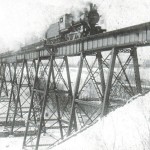 Trains have always fascinated me. I love to ride them, and I love to watch them. I suppose that it could be something that is in my blood, since some of my family members, including my grandpa and my Uncle Bill both worked for the railroad. Or maybe it is just my personal opinion, but I think trains are cool. Whenever Bob and I go somewhere that offers a train ride, we try to plan that into our trip. If you have never taken a ride on a train, you really should consider it sometime. You won’t be disappointed. It is like a time machine, of sorts, taking you back into history.
Trains have always fascinated me. I love to ride them, and I love to watch them. I suppose that it could be something that is in my blood, since some of my family members, including my grandpa and my Uncle Bill both worked for the railroad. Or maybe it is just my personal opinion, but I think trains are cool. Whenever Bob and I go somewhere that offers a train ride, we try to plan that into our trip. If you have never taken a ride on a train, you really should consider it sometime. You won’t be disappointed. It is like a time machine, of sorts, taking you back into history.
The history of trains and the railroad itself is a fascinating one. In a very primitive form, trains existed back as far as 600BC, to move goods from ships to where they needed to go. Early miners had a primitive train since about 1500, called a Wagonway. It really was an invention of necessity. It was very difficult to haul ore out of a mine with a horse and wagon…or a wheelbarrow for that matter. By coming up with a way to transport the ore in wagons on a rail system, it got much easier. Of course, this system wasn’t much good if you were going to go very far, because let’s face it, a series of 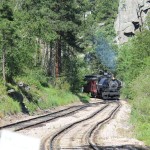 wagons going very far is a slow mode of travel, and it wouldn’t be a Wagonway anyway, because that is called a Wagon Train…oddly enough.
wagons going very far is a slow mode of travel, and it wouldn’t be a Wagonway anyway, because that is called a Wagon Train…oddly enough.
The implementation of the rail system in the United States was necessary to our future too. Getting from one side of this country to the other is not an easy task. Even with the benefit of cars these days, driving cross country takes several days. And while the early trains weren’t much faster than our cars are, you could sleep at night, and keep going. At first the trains only carried supplies and such, but it wasn’t to be very long before they carried people. The first fare paying passenger train began operating in 1807 in Swansea, Wales. From that time on, more and more trains would carry passengers, and in many ways the world became a smaller place after that. Soon trains would criss-cross the United States, and train travel became common. It wasn’t common to just everyplace right away, however, but on this day, January 22, 1888, the first passenger train came into Cheyenne, Wyoming. It left the same day, making Wyoming history…two years before we even became a state.
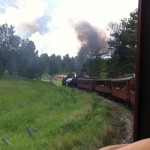 Travel by train would begin to make people feel like they had really come into the modern ages for a while, but with cars and airplanes, it wouldn’t take long for train travel to almost become obsolete. These days, I think that like me, most people ride the train systems because it is a novelty. Bob and I like to ride the 1880 Train from Keystone, South Dakota to Hill City, South Dakota. Basically it is like riding a train to nowhere, because while the two towns are real towns with stores, and people living there, for those riding the train, they are just a quick stop on the journey from one to the other and back again. The whole trip takes an hour one way, and with an hour layover in Hill City, we are back in Keystone in 3 hours…having done nothing more than to relax and enjoy the ride.
Travel by train would begin to make people feel like they had really come into the modern ages for a while, but with cars and airplanes, it wouldn’t take long for train travel to almost become obsolete. These days, I think that like me, most people ride the train systems because it is a novelty. Bob and I like to ride the 1880 Train from Keystone, South Dakota to Hill City, South Dakota. Basically it is like riding a train to nowhere, because while the two towns are real towns with stores, and people living there, for those riding the train, they are just a quick stop on the journey from one to the other and back again. The whole trip takes an hour one way, and with an hour layover in Hill City, we are back in Keystone in 3 hours…having done nothing more than to relax and enjoy the ride.
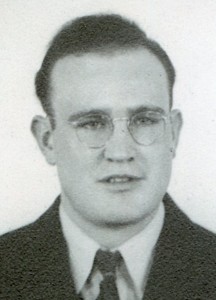 When brothers don’t live in the same town, and in fact live miles from each other, it is easy to find that your brother has changed so much that you don’t recognize him. Such was the case for my Uncle Bill Spencer, and my dad one time when I was a little girl of about eight years. Of course, under normal circumstances, Uncle Bill would have recognized his brother…even if it had been a few years since he saw him last, but my dad had a couple of secret weapons up his sleeve. Dad had grown a beard, which is something he never wore, but this was a special occasion…a centennial celebration, and contest. Since Uncle Bill had not seen him with a beard much, he was at a distinct disadvantage.
When brothers don’t live in the same town, and in fact live miles from each other, it is easy to find that your brother has changed so much that you don’t recognize him. Such was the case for my Uncle Bill Spencer, and my dad one time when I was a little girl of about eight years. Of course, under normal circumstances, Uncle Bill would have recognized his brother…even if it had been a few years since he saw him last, but my dad had a couple of secret weapons up his sleeve. Dad had grown a beard, which is something he never wore, but this was a special occasion…a centennial celebration, and contest. Since Uncle Bill had not seen him with a beard much, he was at a distinct disadvantage.
Another reason that my dad was able to pull one over on his brother is that Uncle Bill was a gun dealer at a gun show, and he never expected his brother to show up there. When we arrived, there were a lot of people milling around. While we stayed out of sight, but where we could watch, Dad went over and started looking casually at some of the guns Uncle Bill had. Uncle Bill was used to letting people take their time, and was waiting to see if anyone had any questions. He simply wasn’t expecting his brother to show up at the gun show, and so he actually looked right through him, 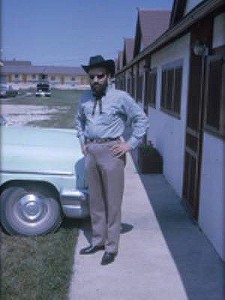 paying no more attention to him that he was to anyone else. When Dad finally asked him a question, it still took a moment for him to connect that this was his brother, because Dad did not look like himself.
paying no more attention to him that he was to anyone else. When Dad finally asked him a question, it still took a moment for him to connect that this was his brother, because Dad did not look like himself.
I’m sure that Uncle Bill was shocked to find that not only was his brother at his gun show, but he had successfully pulled one over on him. The brothers were always joking around, and to be so successful as Dad was in fooling his brother was the ultimate prank in a long line of good natured spoofs that the brothers had played on each other over the years. I can’t say that Uncle Bill never pull a better prank on my dad, because it is entirely possible, but this particular prank was one that was not forgotten, and was probably ranked up there as one of Dad’s best pranks.
This past summer, my mom, sister, Cheryl, and I had the chance to go to Wisconsin and visit Uncle Bill in the nursing home where he lives since Alzheimer’s Disease made it impossible for him to live alone. Because it had been nine years since we last saw him, the memory loss from Alzheimer’s Disease was quite pronounced for us…even though it had actually progressed at a normal pace. We were pleased that while he did not recognize us for ourselves, he did know who we were once we told him that we were his brother’s family. As is common with Alzheimer’s Disease, the patient has good days and bad days. These good days are  days when their memory is better than other days. We were so blessed in that while most of the conversation centered around the past, Uncle Bill was able to remember and relate much of it to us. It was sad to leave him, because we don’t know if we will see him again in this life or not, but knowing what I do of Alzheimer’s Disease, I know that as quickly as we left, he had forgotten that we were ever there…a blessing in some ways. He didn’t have to feel the sadness of parting that we did. He didn’t even remember that we had been there, but that’s ok, because we knew that we had been there, and he enjoyed the visit while it was taking place. Today is Uncle Bill’s 93rd birthday…an amazing accomplishment for him. Happy birthday Uncle Bill!! Have a wonderful day!! We love you very much!!
days when their memory is better than other days. We were so blessed in that while most of the conversation centered around the past, Uncle Bill was able to remember and relate much of it to us. It was sad to leave him, because we don’t know if we will see him again in this life or not, but knowing what I do of Alzheimer’s Disease, I know that as quickly as we left, he had forgotten that we were ever there…a blessing in some ways. He didn’t have to feel the sadness of parting that we did. He didn’t even remember that we had been there, but that’s ok, because we knew that we had been there, and he enjoyed the visit while it was taking place. Today is Uncle Bill’s 93rd birthday…an amazing accomplishment for him. Happy birthday Uncle Bill!! Have a wonderful day!! We love you very much!!
 Pretty much everyone has taken a ride on a roller coaster, but have you ever thought about where these originated or who thought them up? You might be surprised to learn that the roller coaster originated in Russia. I know that this is not at all what I expected. In Russia, they built a wood frame that the sledders used to fly down 70 foot high mountain slopes as early as the 16th century. Now, I don’t know it I would consider that to be a roller coaster, but I can tell you that I know it would be a scary ride. There weren’t any breaks on the whole thing. Just you and gravity. The ride was so popular that they built a summertime version…a wheeled cart that took riders down a wooden ramp. If that version, which I have seen in Jackson, Wyoming, and Keystone, South Dakota, though not at 70 foot drops, was as uncontrolled as the first one, I would not be on it.
Pretty much everyone has taken a ride on a roller coaster, but have you ever thought about where these originated or who thought them up? You might be surprised to learn that the roller coaster originated in Russia. I know that this is not at all what I expected. In Russia, they built a wood frame that the sledders used to fly down 70 foot high mountain slopes as early as the 16th century. Now, I don’t know it I would consider that to be a roller coaster, but I can tell you that I know it would be a scary ride. There weren’t any breaks on the whole thing. Just you and gravity. The ride was so popular that they built a summertime version…a wheeled cart that took riders down a wooden ramp. If that version, which I have seen in Jackson, Wyoming, and Keystone, South Dakota, though not at 70 foot drops, was as uncontrolled as the first one, I would not be on it.
Many of the early roller coasters, which were probably not what we would consider to be real roller coasters either, were designed as improvements to incline railways systems. Those patents began as early as July 2, 1872, but they were designed to take you from the top to the bottom of a hill or canyon, like the one at Royal Gorge in Colorado, or at Lookout Mountain in Chattanooga, Tennessee. I have had the pleasure of riding and both of those and I enjoyed them very much. I’m sure that most people would consider this type of ride to be pretty tame, as it is very controlled. It would have to be controlled in order to stop at the bottom.
 The Circular Railway, is probably the type of roller coaster that most of us rode as children. There are a few hills and slightly fast moments, but for the most part, it goes around in a circle, while going up and down hills. Pretty tame in the eyes of most thrill seekers, but for little kids, it works pretty well, or at least the old style did. I don’t know if some of the current circular railway roller coasters are scary or not.
The Circular Railway, is probably the type of roller coaster that most of us rode as children. There are a few hills and slightly fast moments, but for the most part, it goes around in a circle, while going up and down hills. Pretty tame in the eyes of most thrill seekers, but for little kids, it works pretty well, or at least the old style did. I don’t know if some of the current circular railway roller coasters are scary or not.
Probably one of the most famous roller coasters received it’s patent on this day, January 20, 1885, and was the first Switchback Railway roller coaster. If you thought about it, you might guess that is was at New York’s famous Coney Island. It was designed by LaMarcus Thompson, and debuted in 1884. This roller coaster was considered to be the first successful roller coaster. It was really a fairly primitive Gravity Switchback Railway, but the people loved it, and it immediately began bringing in as much as $600.00 a day…an amazing amount of money in 1884.
Roller coasters continued to be very popular until economic changes in he 1940s, 50s, and 60s caused them to lose their appeal. Nevertheless, the roller coaster would rise again. Now, we have Megacoasters, Hypercoasters, and Gigacoasters. Megacoasters such as Phantom’s Revenge in Pittsburgh’s Kennywood Park or The Beast at King’s Island were first. Hypercoasters standing 200 feet high, the first of which was Cedar Point’s Magnum XL-200 and the Desperado near Las Vegas, Steel Force at Dorney Park in Allentown, Pennsylvania and Mamba at Worlds of Fun  in Kansas City, Missouri, took things to the next level. Cedar Point then introduced Millennium Force, the world’s first Gigacoaster topping off at an astounding 310 feet above the ground.
in Kansas City, Missouri, took things to the next level. Cedar Point then introduced Millennium Force, the world’s first Gigacoaster topping off at an astounding 310 feet above the ground.
I suppose that in order to compete, rollercoasters will continue to become more wild, higher, and scarier as time goes on. I’m sure that many people look forward to each new one that is developed, but since I never liked merry-go-rounds or anything much scarier than a Ferris Wheel, I guess that I will have to leave those riding challenges to someone with more of a stomach for it than I have.
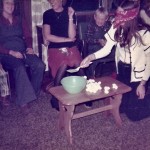 A young friend of mine recently had a new baby, and I was reminded if the age old tradition of the shower. Women through the years have helped brides-to-be and soon to be moms prepare for the upcoming event for some time now. The bridal shower got it’s start in 1890, and is mostly a tradition held in the United States, Canada, Australia, and New Zealand. The baby shower was one that transitioned from the purification rituals that used to occur back when women had to remain in seclusion for 14 days after giving birth, to the naming and baptismal ceremonies, and finally to what they are today, which is more of a way to welcome the new baby with gifts that are necessary for caring for the child. Personally, I like them more for what they are today, as I’m sure most people would agree. These days, the showers just as often include the husband-to-be or the new daddy, in what used to be a pretty much exclusively female party.
A young friend of mine recently had a new baby, and I was reminded if the age old tradition of the shower. Women through the years have helped brides-to-be and soon to be moms prepare for the upcoming event for some time now. The bridal shower got it’s start in 1890, and is mostly a tradition held in the United States, Canada, Australia, and New Zealand. The baby shower was one that transitioned from the purification rituals that used to occur back when women had to remain in seclusion for 14 days after giving birth, to the naming and baptismal ceremonies, and finally to what they are today, which is more of a way to welcome the new baby with gifts that are necessary for caring for the child. Personally, I like them more for what they are today, as I’m sure most people would agree. These days, the showers just as often include the husband-to-be or the new daddy, in what used to be a pretty much exclusively female party.
One tradition, when it comes to showers, that people either like a lot, or completely dislike is the traditional shower 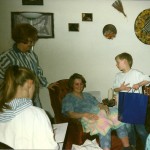 games. We have all been to showers where you tried to name the new baby, diaper a balloon, remember the kitchen utensils on a tray, or give marriage advise to the young couple. Not everyone likes to play these things, and having been to showers of both types, I really have to say that I like both. I think it is simply a matter of taste…and maybe of well thought out games. In the years that I have been attending showers, I have played just about every possible game, and I must say that there have been a few that were great. I personally liked the diapering the balloon, the name game, and the balloon under the shirt game. That one was actually played for the first time…by me anyway, at my niece, Ashley Parmely’s baby shower, and it was hilarious. Of course, as the mother-to-be, Ashley won. The point was to see who could have the biggest belly. Technically, Ashley had a distinct advantage over the rest of us…she had the balloon belly, and the Reagan belly. The rest of us didn’t stand a chance, but it was fun to try to get a belly that was bigger than hers.
games. We have all been to showers where you tried to name the new baby, diaper a balloon, remember the kitchen utensils on a tray, or give marriage advise to the young couple. Not everyone likes to play these things, and having been to showers of both types, I really have to say that I like both. I think it is simply a matter of taste…and maybe of well thought out games. In the years that I have been attending showers, I have played just about every possible game, and I must say that there have been a few that were great. I personally liked the diapering the balloon, the name game, and the balloon under the shirt game. That one was actually played for the first time…by me anyway, at my niece, Ashley Parmely’s baby shower, and it was hilarious. Of course, as the mother-to-be, Ashley won. The point was to see who could have the biggest belly. Technically, Ashley had a distinct advantage over the rest of us…she had the balloon belly, and the Reagan belly. The rest of us didn’t stand a chance, but it was fun to try to get a belly that was bigger than hers.
Some of the funniest shower games are those played with a blindfold on…like the one above, in which my sister-in-law Jennifer Parmely was trying to scoop all the cotton balls into a bowl, without being able to see  them. They are so light that you really don’t know if you have anything on there or not, and since you can’t use your other hand to assist in the process, you find yourself being less than successful. And since it seems that there are always a few little ones in the group, the laughter can get going pretty easily. My brother-in-law, Ron Schulenberg found his sister’s attempts quite hilarious indeed. It’s all intended to break the ice among friends of the honoree, who may not know each other, as well as adding a little bit of laughter and fun to the whole occasion. So the next time you go to a shower, and find that games will be played, try taking a lighter view of it. You might find yourself having a great time, even if you don’t usually like to play those silly shower games.
them. They are so light that you really don’t know if you have anything on there or not, and since you can’t use your other hand to assist in the process, you find yourself being less than successful. And since it seems that there are always a few little ones in the group, the laughter can get going pretty easily. My brother-in-law, Ron Schulenberg found his sister’s attempts quite hilarious indeed. It’s all intended to break the ice among friends of the honoree, who may not know each other, as well as adding a little bit of laughter and fun to the whole occasion. So the next time you go to a shower, and find that games will be played, try taking a lighter view of it. You might find yourself having a great time, even if you don’t usually like to play those silly shower games.
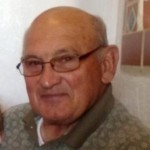 Sometimes in life, we are handed a blessing that takes us by surprise. Such was the case with Uncle Butch Schulenberg. Butch is my father-in-law, Walt Schulenberg’s half brother, and since my father-in-law’s passing, I have had the wonderful opportunity to get to know Butch, if only through Facebook. This is a fact that I’m sure my father-in-law would be quite pleased about. When my father-in-law passed away, we needed to let his family in Forsyth, Montana know. It was a hard time for all of us. Then, something very nice began to happen. I had connected via Facebook with Butch Schulenberg’s daughter, Andi Kay, and that has led to blessed connections with her brothers Tadd and Heath, and her sister-in-law, Jennifer, as well as Butch’s wife, Charlys and their granddaughter Savannah. Each of those connections is a sweet blessing in it’s own way, and I am so thankful for each, but the connection to Butch as been especially wonderful, because of the kind of man he is.
Sometimes in life, we are handed a blessing that takes us by surprise. Such was the case with Uncle Butch Schulenberg. Butch is my father-in-law, Walt Schulenberg’s half brother, and since my father-in-law’s passing, I have had the wonderful opportunity to get to know Butch, if only through Facebook. This is a fact that I’m sure my father-in-law would be quite pleased about. When my father-in-law passed away, we needed to let his family in Forsyth, Montana know. It was a hard time for all of us. Then, something very nice began to happen. I had connected via Facebook with Butch Schulenberg’s daughter, Andi Kay, and that has led to blessed connections with her brothers Tadd and Heath, and her sister-in-law, Jennifer, as well as Butch’s wife, Charlys and their granddaughter Savannah. Each of those connections is a sweet blessing in it’s own way, and I am so thankful for each, but the connection to Butch as been especially wonderful, because of the kind of man he is.
Butch reminds me a lot of my grandfather, George Byer. He is an encouraging sort of man who always makes you feel important. I’m sure his kids and grandkids can attest to that, because I’m sure that over the years he has encouraged them in whatever they chose to do. Of course, being encourage is not the only reason I feel a closeness to Uncle Butch. It’s because he has just welcomed me into his family. Unfortunately, for many years, there was not a closeness between my husband’s grandfather, Andrew Schulenberg, and my father-in-law, Walt Schulenberg, but when they decided to set aside those feelings and reconnect, that was for them the end of a long era of being distant from each other.
It is strange, however, that somehow, I was unaware of the relationship the half brothers had developed. It wasn’t until I was involved in taking care of my father-in-law, that I even knew that they were in touch with each other at all. Of course, it is no surprise that these two men would get along so well, because I believe they are two of a kind. It is a hard thing to fully express the personalities of these men, but gentleness, kindness, encouraging, and accepting are words that all come to my mind. These are attributes that really leave a person no choice but to like the person who has them…and these men have, or in my father-in-law’s case, had these attributes. They leave a person room to be their own person, knowing that the people they respect, also respect them enough to trust their judgment, and celebrate their successes. Even if the accomplishment isn’t anything major, these men could make it feel like it was. Can it get any better than that? I don’t think so.
I’m not saying that I crave praise, or that it is the praise that makes Butch special, because that would be inaccurate. It is just the person Butch is that makes his very dear to me. Every interaction I have with him 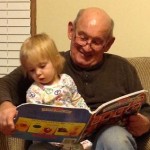 reiterates just how much I like the person he is. At some point, we are hoping to meet up and have an actual face to face conversation, with several of us in attendance, an idea that I am very much looking forward to. Still, for now, I am glad to have connected with him on Facebook, because it has given us the chance to get to know each other. This isn’t Butch’s birthday or any other special day that I know of, but rather just a chance for me to tell this sweet uncle just how glad I am that our families have connected…because he has been such a surprise blessing, and one I feel very thankful to have received. Of course, that blessing is nothing new to those who have known Butch all their lives. Thank you Butch for being an important part of my life, and the lives of all the people you touch with your gentle kindness. We love you!!
reiterates just how much I like the person he is. At some point, we are hoping to meet up and have an actual face to face conversation, with several of us in attendance, an idea that I am very much looking forward to. Still, for now, I am glad to have connected with him on Facebook, because it has given us the chance to get to know each other. This isn’t Butch’s birthday or any other special day that I know of, but rather just a chance for me to tell this sweet uncle just how glad I am that our families have connected…because he has been such a surprise blessing, and one I feel very thankful to have received. Of course, that blessing is nothing new to those who have known Butch all their lives. Thank you Butch for being an important part of my life, and the lives of all the people you touch with your gentle kindness. We love you!!
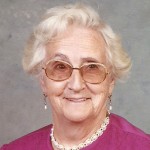
 Several of my cousins were talking a couple of days ago on Facebook, about our grandmother, Hattie Byer, and how she kept her numerous grandchildren in line when they were at her house. Now, in reality, I pretty much mean Greg Hushman, Elmer Johnson, and Forest Beadle, because most of the rest of us would never have done anything to provoke the Wrath of Grandma!! It’s funny, but I can almost hear the skepticism from every reader. Ok, I’ll admit that I was no less likely to get into trouble with Grandma than Greg, Elmer or Forest, but I truly don’t recall having her coming after me with the broom, although my cousin Shirley Cameron, who is from the other side of my family remembers it once or twice, when she was over there with us.
Several of my cousins were talking a couple of days ago on Facebook, about our grandmother, Hattie Byer, and how she kept her numerous grandchildren in line when they were at her house. Now, in reality, I pretty much mean Greg Hushman, Elmer Johnson, and Forest Beadle, because most of the rest of us would never have done anything to provoke the Wrath of Grandma!! It’s funny, but I can almost hear the skepticism from every reader. Ok, I’ll admit that I was no less likely to get into trouble with Grandma than Greg, Elmer or Forest, but I truly don’t recall having her coming after me with the broom, although my cousin Shirley Cameron, who is from the other side of my family remembers it once or twice, when she was over there with us.
One thing I do remember, and that I know every one of Grandma’s grandchildren will agree on, Grandma was the boss when you were at her house. You see, those were the days when it didn’t matter if the adult in the vicinity was your parent, grandparent, or the parent of the friend you were visiting, they all disciplined the kids who got out of line. And if some adult caught you doing something in the public arena that you shouldn’t be, such as graffiti or some other such mischief, they weren’t afraid to tell you to “knock it off” either. That was just the way things were back then. From what I am told of this barely five foot tall, broom wielding grandma of mine, she was able to make that broom go around corners, so if you thought you were going to get away from her, you might just as well think again.
I certainly remember that when you found yourself in trouble with Grandma, you were about to get a very clear understanding of what the word “trouble” meant. Yes, I too, had my share of times in my childhood where I found myself on the wrong side of Grandma Byer. Oh boy, believe me, it was not a place you wanted to be. And don’t think she was going to threaten to tell your mom just how bad you were, and then conveniently forget to do it when the time actually came for your parents to come home. Grandma wasn’t about to be the helpless little babysitter who had to wait for your parents to make you behave…oh no!! Whether she used a broom, her hand, or some other punishment, believe me when I say the punishment was swift, and it fit the crime. You see, Grandma was old school, before there was a new school form of discipline. People weren’t afraid of some well meaning, but not too bright passerby telling them they shouldn’t spank that kid…those people didn’t exist then. People knew that most situations required a little whack on the seat to get through to the brain. For many of us those lessons made it crystal clear, who was in charge, who was acting up, who would refrain from such activities in the future, and who would apologize for their elders for acting such a horrible fashion in the first place.
For most of us, the discipline Grandma dished out, is looked back on with a smile, because we all knew how much she loved us. People who have never had any discipline simply don’t understand that discipline is a form of love. Does it hurt…yes, because it is tough love, but are you better for it…oh yeah, because they love you very much. If your parents or grandparents didn’t care about you, they would have no need to want you to 
 behave. They just wouldn’t care, but since they do, they want you to know how to act in public, because then people are happy to have you around. And for any of you, who have ever been around an out of control kid, can you honestly tell me that you did not wish their parents would just give them a spanking? Of course you did. So to my grandma, to her broom, and to our parents, aunts, uncles, and teachers…I say thank you. Whether we felt the broom on our backside, or some other form of discipline, I can say that we all turned out pretty good. And people don’t seem to mind having us around.
behave. They just wouldn’t care, but since they do, they want you to know how to act in public, because then people are happy to have you around. And for any of you, who have ever been around an out of control kid, can you honestly tell me that you did not wish their parents would just give them a spanking? Of course you did. So to my grandma, to her broom, and to our parents, aunts, uncles, and teachers…I say thank you. Whether we felt the broom on our backside, or some other form of discipline, I can say that we all turned out pretty good. And people don’t seem to mind having us around.
 Once a war is over, the people of the world, and especially those who fought in the war never really want to think about it again, but it is, nevertheless, a permanent part of history. It was on this day, January 16, 1991 that America would go to war with Iraq for the first time, and it would be a war that would ultimately draw my brother-in-law, Ron Schulenberg back into the service from the reserves, which is where every soldier is for a time following their active duty term. Ron had joined the Army during a time when things were relatively quiet around the world, and he also ended his active service during a relative time of peace, but all that would change for him when he was notified that he would have to go back to active duty, and to Iraq.
Once a war is over, the people of the world, and especially those who fought in the war never really want to think about it again, but it is, nevertheless, a permanent part of history. It was on this day, January 16, 1991 that America would go to war with Iraq for the first time, and it would be a war that would ultimately draw my brother-in-law, Ron Schulenberg back into the service from the reserves, which is where every soldier is for a time following their active duty term. Ron had joined the Army during a time when things were relatively quiet around the world, and he also ended his active service during a relative time of peace, but all that would change for him when he was notified that he would have to go back to active duty, and to Iraq.
I can only imagine how Ron felt upon receiving that letter. I know how the rest of us felt. We were very concerned for Ron’s safety. None of us wanted him to go, but this was not up to us. The government, and specifically the Army had spoken, and go he would. I remember talking to him about his time over there, years later. One of the things that most civilians wonder about is things like how they felt about killing someone else, or even just seeing a dead body that had been mutilated by the weapons of warfare. For Ron, one of the  strongest memories was marching from one place to another and seeing all the death that was all around them…and then simply stepping over it, like it was a rock or tree stump. In my mind, that would be almost impossible to do, but I suppose that you simply get used to some things…or as much as anyone can get used to war and death.
strongest memories was marching from one place to another and seeing all the death that was all around them…and then simply stepping over it, like it was a rock or tree stump. In my mind, that would be almost impossible to do, but I suppose that you simply get used to some things…or as much as anyone can get used to war and death.
The Persian Gulf War…known as Operation Desert Storm, was a short lived war. Saddam Hussein invaded the little country of Kuwait, because of their oil, making Egypt and Saudi Arabia very nervous, so they called on the United States. When Saddam Hussein refused to leave Kuwait, the war began. The biggest anomaly in Operation Desert Storm, was that the Iraqi soldiers were either not well enough equipped, or simply not willing to die for this cause, and so may of them actually came up to the American troops, and surrendered. I’m sure that the initial fighting, and the amount of war dead lying around the desert, made the decision to surrender seem like the best option. Ron told of this anomaly when we talked about his experiences, and it seemed that it was with a continued sense of relief. I can imagine that the thought of having to kill someone was not one that my brother-in-law relished, but something he would have had to do, had it became necessary.

Ron returned to us from Operation Desert Storm, and his time in the reserves ended. The Persian Gulf area would continue to become more and more unstable, but by the time America would again find herself at war with Iraq and Saddam Hussein, Ron was not required to go. While it is my belief that the second war with Iraq has been far more successful, it has also been filed with far more casualties. I believe that if we had gone in and removed Saddam Hussein during Operation Desert Storm, the world would have been a better place. Would that have prevented the need to go back? I don’t know, but it would have spared many of the lives of the countless people that Saddam Hussein slaughtered during his time in power.

